What if CPS or Police Force Their Way Into My Home?
CPS are able to forcibly enter a home with a court order.
 Written by Background Check Repair
Written by Background Check Repair
Criminal Records | April 30, 2024
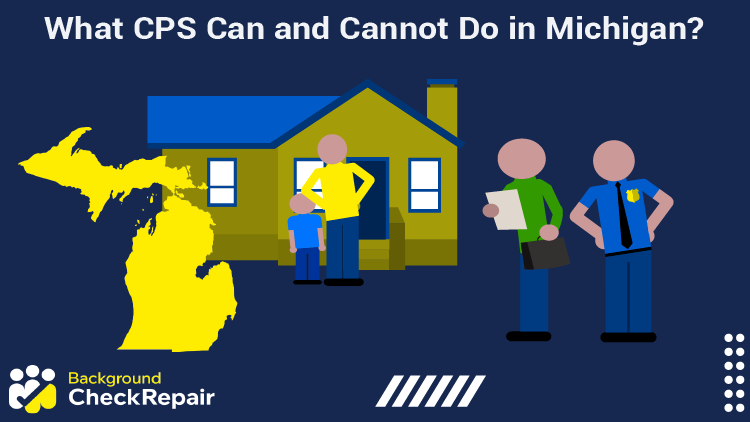
Table of Contents
Facing a CPS investigation can be a stressful time, but knowing what CPS can and cannot do in Michigan can greatly help individuals keep custody of their children and navigate the situation successfully.
Although there are some local laws that individuals will want to familiarize themselves with, by understanding the investigation process and possible outcomes, parents can better prepare for any situations in which custody of their children is at risk.
This complete guide explains exactly what CPS can and cannot do in Michigan, and how parents can protect their children from entering state custody.
Although many individuals will be worried about what CPS can and cannot do in Michigan, understanding the entire process of a CPS investigation can provide the best chance of getting through the process without any surprises.
There are tons of different things to consider during a CPS case, and in many situations, things can progress extremely quickly so having prior knowledge of the way CPS agencies operate is essential.
CPS or child protective services is a state government agency that is essentially in charge of the well-being of children through investigating possible abuse and neglect and making recommendations to the courts as to how to handle the situation.1
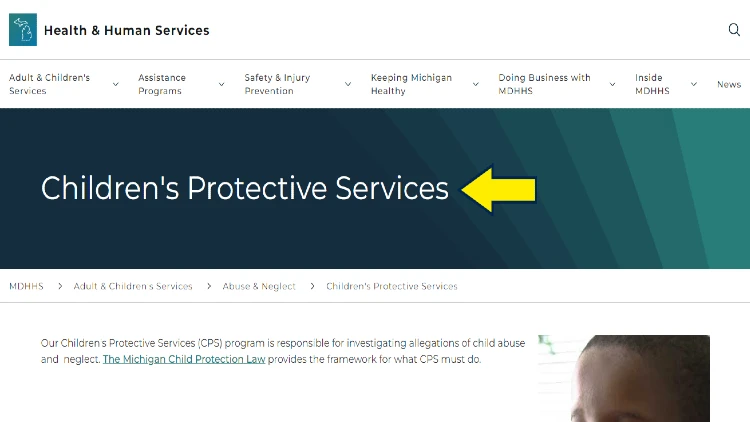
The Health and Human Services Department in Michigan operates the CPS program, making it a very large bureaucratic operation.
In Michigan, CPS is a division of the Michigan Department of Health and Human Services (MDHH).2
Individuals should familiarize themselves with some of the state practices regarding child abuse cases that are outlined by MDHH.3
In the majority of cases, CPS investigations will be opened as the result of a report made by a third party that has reason to believe that a child may be the victim of abuse or neglect.
In some cases, this report might be made by someone else that lives in the household, a neighbor, or even a non-custodial parent.4 However, the majority of reports made to CPS are made by mandatory reporters,5 which are individuals who hold certain positions in which they are legally required to report suspicions of abuse or neglect to CPS.
The most common example of this is teachers, however medical professionals, other school administrators, and even mental health professionals are all considered mandatory reporters.
But, when asking who can report child abuse or child neglect, anyone can file a report to CPS and takes all reports extremely seriously.6
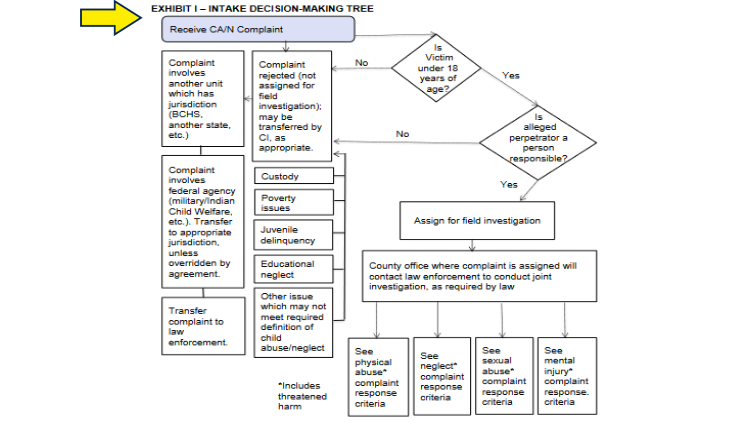
A complaint to CPS can be made by anyone in Michigan, which means that some complaints can be the result of malicious interference. However, the majority are made in good faith.
When the CPS investigation begins, CPS will likely make contact with the parent, often by showing up at the residence unannounced. In most cases, CPS will want to speak with the parent that the report was made about as well as anyone who lives in the household, the person who made the report, and the child themselves.
Should there be no evidence of abuse or neglect has occurred, then CPS will likely close the case and the process will essentially be over. However, should CPS find any evidence that abuse or neglect is taking place they will likely approach the parents with these findings and possibly offer them a plan that the parents can complete in order to close the case.
Should these steps not be taken by the parents, then the CPS caseworker will involve the courts at which point the custody of the child will be in jeopardy.
It’s important to remember that despite the phrase ‘CPS case,’ being used so frequently, only CPS has opened a case against the individual, and the courts will not be involved until later.
A more apt name would be “CPS investigation,” since no formal charges will be made when the case first opens because many cases will involve false reports as means of harassment.
Many people will have questions like, do you have the right to know the charges against you in detail during a CPS case, however there are not any charges filed during the initial phases so CPS has no legal obligation to explain the nature of the report to the individual.
Knowing what CPS can and cannot do in Michigan can make the difference between keeping custody of your children and losing them completely. Luckily, compared to law enforcement agencies, the powers of CPS are somewhat limited.
The most notable powers that CPS will exercise during their investigation are outlined below.
CPS will most often try to surprise individuals who have reports made against them to prevent the individual from trying to cover up any abuse or neglect that has been occurring. Many individuals will only learn about a CPS investigation when a CPS caseworker shows up at their front door and asks to be let inside and starts asking questions about the children in the household.
Many people will be wondering, do you have the right not to answer questions, and the answer is yes. Individuals are not required to answer questions from a CPS worker, and many lawyers will advise that their clients do not answer questions as they risk incriminating themselves.
As soon as an individual is aware that they are under investigation by CPS, they should contact an attorney immediately. An experienced lawyer will be able to guide parents through the process and give them the best chance of keeping their children.
Another common question that people have about CPS investigations is, can CPS interview my children at school without my permission or me present, and the answer is yes.
CPS is able to talk to children without the parents having any notice that the conversation is happening.
This is mainly done to protect the children and prevent situations in which the abuser can coach the child into what kind of answers to provide in order to prevent the child from incriminating the parent.
Although CPS can not decide on a whim to remove a child from a home, if there is evidence of abuse or neglect occurring, CPS will make a recommendation to the courts who will likely sign a court order to have the children removed from the home.
This may be done temporarily at first until the court proceedings are finished, at which point the children may be removed permanently or returned to the parent.
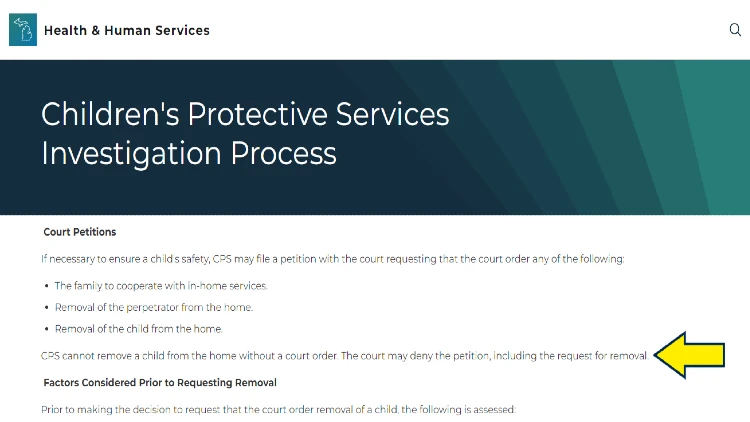
Before parents know it, a court order can be filed to physically remove a child from their home.
Where the child goes when they are removed from the home is discussed further down.
Finally, should the investigation reveal evidence of abuse or neglect, CPS will likely recommend to the courts that the parent’s parental rights be taken away.
The more severe the abuse or neglect, the more likely that the individual will lose their parental rights and the child will be permanently removed from their custody.
There are a few notable things that CPS is not able to legally do that parents should be aware of.
Not only could CPS lie about their powers in order to trick individuals, but a CPS caseworker breaking the law during the investigation could be grounds for the case to be dismissed.
Many people will want to know, do you have the right not to let CPS into your home unless they have a signed warrant or court order, and the answer is yes.
CPS in Michigan must be invited into the home or have a court order should they want to enter the home by force.
When it comes to can CPS enter my home, individuals will likely be advised by their lawyer to turn CPS away at the door, in order to protect themselves.
However, CPS will eventually get a court order to continue its investigation.
The use of illegal substances is often considered neglect by CPS and CPS caseworkers will likely want a parent to take a drug test if evidence of drug use is revealed during their investigation.
Individuals may wonder, should I submit to drug testing, can CPS drug test me? The answer is no.
CPS can not force someone to take a drug test without their consent. However, similar to the issue of CPS entering your home, they are able to get court orders to require the individual to take the test.
Although knowing this kind of information is extremely important, all individuals under CPS investigation should contact a lawyer as soon as possible.
Many people will find themselves in a situation where they might ask themselves, the CPS worker seems nice, why not just cooperate? However, just like law enforcement, CPS will often try to seem nice and helpful in an effort to learn more information that could incriminate the individual.
Knowing how to get a CPS case dismissed is extremely important as it allows individuals to recognize certain signs that there are grounds for the case to be dismissed or closed, and allows them to avoid a lengthy legal battle.
When it comes to how to get a CPS case dismissed in Michigan, there are two main ways this can happen: CPS closing the case themselves, or a judge dismissing the case.
CPS case statistics show that the majority of CPS cases are closed by the CPS caseworker after finding no evidence of abuse or neglect.7 This is why cooperating with a CPS caseworker can sometimes be a good idea, as it will allow for the investigation to be sped up and closed sooner rather than later.
However, should there be evidence of abuse or neglect and the courts begin to get involved,8 individuals will need to rely on the judge to dismiss the case.
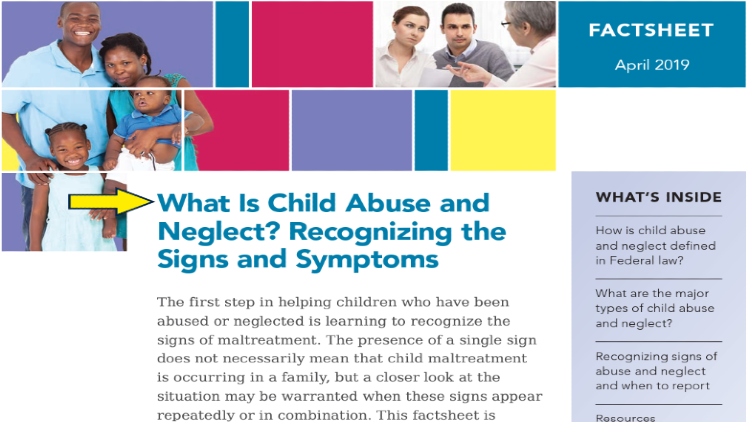
The definition of child neglect and abuse, as defined by Michigan law, can include a number of situations, including witnessing physical or verbal abuse.
Once the courts are involved, it is much harder to get a case dismissed.
In general, cases will be dismissed for one of two reasons. Either the judge will determine there is not enough evidence for the case to be continued, or the judge will determine that procedural issues with the investigation make the case illegitimate.
In both cases, this decision will likely be prompted by the parent filing a motion for dismissal with the courts.
Once again, this is where a lawyer makes a huge difference as they can help draft the motion for dismissal. Unfortunately, getting a judge to dismiss a case is extremely difficult as there is likely already significant evidence of abuse or neglect if the case has reached the courts.
CPS is also a highly-professional organization and major procedural issues that can cause a case to be dismissed are rare.
After a CPS investigation, many people will wonder till when may a CPS case remain on record, however only CPS cases that involve criminal charges will appear on an individual’s record.
There will be a record of the investigation with CPS, but when it comes to who has access to CPS Records, they will only be used internally by CPS as a reference should the individual be investigated again.
Part of the concern over CPS records has to do with individuals hearing about child abuse investigations. However, there is actually a teaching background screening, daycare background screening, and other individuals who have access to children.
The check is also known as a child care background check or child abuse background check and is required by federal law.9
Individuals who are still concerned should know how to perform a criminal records check on themselves using the search bar at the top of this page.
Does CPS notify the other parent when parents of the child are no longer together? Only sometimes.
CPS will notify parents who have partial custody as there is a good chance the custody of the child will be temporarily transferred to this parent during the investigation.
Those wondering, what is a “Court-Appointed Special Advocate,” is simply the person that the child will stay with should custody be taken away temporarily or permanently if there is no other parent or family member that the child can stay with.
Does CPS have to notify the other parent? No.
The other parent will only be notified if they are possibly going to be taking custody of the child.
Parents who are not involved with their children will usually not be notified.
In a CPS case, the non-offending parent can also play a big role in the investigation. The parent who is not under investigation will likely obtain temporary custody of the child for the duration of the investigation.
Beyond this, the non-offending parent also has several rights they can exercise, assuming they have at least partial custody of the child.
The rights of the non-offending parent include being able to appear at any court hearings pertaining to the case where they are able to ask questions and provide evidence and testimony to the judge in the case. This is a great chance for non-offending parents to advocate for their children.
The parent knowing her rights or knowing his rights, as the non-offending parent can heavily impact the custody of the child.
The CPS non-custodial parent is simply the parent that does not have primary custody. In many cases, the non-custodial parent will automatically be given custody of the child during a CPS investigation.
The non-offending parent evaluation is used when the child is being transferred to a safe home when a CPS investigation reveals abuse or neglect and the decision is made to remove the child from the home.
The grounds for involuntary termination of parental rights are outlined by federal law.10 Most notably, instances of severe abuse, such as sexual or physical abuse, and instances of severe neglect, such as abandonment will be grounds for the termination of parental rights.
When it comes to what CPS can and cannot do in Michigan, their powers are fairly straightforward. Individuals should know that CPS is not able to force individuals to do hardly anything, however, their powers can be greatly increased with court orders based on their recommendations.
Although it can seem overwhelming, those under CPS investigation should do their best to understand their local laws regarding child custody and what is considered abuse or neglect. Knowing what CPS can and cannot do in Michigan can determine if individuals are able to retain or lose custody of their children.
CPS are able to forcibly enter a home with a court order.
A lawyer guardian ad litem is a court-appointed lawyer who advocates for the child in a CPS case.11
Many children will benefit from having an LGAL but they are generally not required.
Individuals are not required to cooperate with CPS.
The individual who is appointed court personnel will be responsible for the cost.
CPS can only force individuals to sign medical releases with a court order.
Individuals should seek attorneys that are experienced in family law.
A foster parent background check is the federally required background check for individuals hoping to become foster parents.
CPS can forcibly enter a home with a court order to do so.
Getting a CPS case dismissed in Texas usually requires a judge to grant a motion for dismissal submitted by the parent.
CPS cases can be dropped or dismissed due to lack of evidence or procedural issues.
CPS is only able to enter your home or make individuals take a drug test with a court order. However they are able to talk to children without the knowledge of the parent.
CPS caseworkers in New York are able to ask questions of the child without the parent’s permission, however, they must get permission or a court order to enter an individual’s home.
When it comes to determining a person’s job for garnishment, government agencies will likely be required to find where someone works as they have access to IRS and SSA databases.
Finding out where an individual is employed for child support can often be achieved by performing a social media background investigation. However there is no official employment database that individuals can search.
CPS background checks go back forever and will uncover sealed and sometimes expunged crimes.
1State of Michigan. (2023). Children’s Protective Services. State of Michigan. Retrieved January 03, 2023, from <https://www.michigan.gov/mdhhs/adult-child-serv/abuse-neglect/childrens>
2State of Michigan. (2023). Michigan Department of Health & Human Services. Health & Human Services. Retrieved January 03, 2023, from <https://www.michigan.gov/mdhhs>
3State of Michigan. (2023). Children’s Protective Services Investigation Process. Health & Human Services. Retrieved January 03, 2023, from <https://www.michigan.gov/mdhhs/adult-child-serv/abuse-neglect/childrens/report-process/investigation-process-and-results/childrens-protective-services-investigation-process>
4DC Child Support Services Division. (2023). Non-Custodial Parents. Child Support Services Division. Retrieved January 03, 2023, from <https://cssd.dc.gov/page/non-custodial-parents>
5U.S. Department of Health and Human Services. (2019). Mandatory Reporters of Child Abuse and Neglect. Child Welfare Information Gateway. Retrieved January 03, 2023, from <https://www.childwelfare.gov/topics/systemwide/laws-policies/statutes/manda/>
6State of Michigan. (2023). Reporting Process. Health & Human Services. Retrieved January 03, 2023, from <https://www.michigan.gov/mdhhs/adult-child-serv/abuse-neglect/childrens/report-process>
7U.S. Department of Health and Human Services. (2023). Statistics. Child Welfare Information Gateway. Retrieved January 03, 2023, from <https://www.childwelfare.gov/topics/systemwide/statistics/>
8U.S. Department of Health and Human Services. (2022). Definitions of Child Abuse and Neglect. Child Welfare Information Gateway. Retrieved January 03, 2023, from <https://www.childwelfare.gov/topics/systemwide/laws-policies/statutes/define/>
9Childcare.gov. (2023). Background Checks: What You Need To Know. Childcare.gov. Retrieved January 03, 2023, from <https://childcare.gov/consumer-education/background-checks-what-you-need-to-know>
10U.S. Department of Health and Human Services. (2021, September 08). Grounds for Involuntary Termination of Parental Rights. Child Welfare Information Gateway. Retrieved January 03, 2023, from <https://www.childwelfare.gov/pubpdfs/groundtermin.pdf>
11Michigan Judiciary. (2023). Lawyer-Guardian Ad Litem Resources. Michigan Courts. Retrieved January 03, 2023, from <https://www.courts.michigan.gov/administration/offices/child-welfare-services/cws-training-and-development/lgal-online-training/>
We use cookies to ensure that we give you the best experience on our website. If you continue to use this site we will assume that you are happy with it